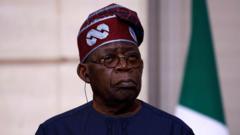Amid accusations of ethnic bias in presidential appointments, President Bola Tinubu's administration is under scrutiny for the disproportionate representation of the Yoruba ethnic group in key positions. Critics fear such dominance could jeopardize Nigeria's fragile national unity, highlighting the challenges of accommodating diverse ethnic interests in governance.
Ethnic Tensions Rise as Nigeria's Leadership Faces Criticism Over Appointments

Ethnic Tensions Rise as Nigeria's Leadership Faces Criticism Over Appointments
Concerns mount over President Bola Tinubu's cabinet choices as ethnic favoritism allegations stir unrest in Nigeria.
In Nigeria, political stability and national unity have long relied on a delicate balancing act of ethnic and religious representation within government. However, recent developments have sparked concerns that President Bola Tinubu's administration may be veering away from this crucial principle. The informal understanding among Nigeria's political elites—spanning over 250 ethnic groups—has been that presidential appointments should reflect the country’s diverse fabric, aiming to promote national cohesion.
Critics of Tinubu's leadership, now two years in, argue that his appointments appear to favor his own Yoruba ethnic group. This perception comes after the president selected a northern Muslim to be his running mate during his election, breaking a longstanding convention of mixed religious tickets that typically combines Muslim and Christian candidates. This shift has resulted in an intensified scrutiny of his appointments, as the president is tasked with uniting a nation susceptible to ethnic and religious divisions.
As of April 2023, all eight of the most critical positions in Tinubu’s administration—central bank, state oil company, police, army, customs, intelligence, anti-corruption, and revenue service heads—are filled by individuals from the Yoruba ethnic group. This unprecedented concentration of power has raised alarms among various factions, particularly those from the north, who perceive this trend as a potential pathway toward ethnic dominance in government. This is a sentiment echoed by political analysts and historians who caution against the implications of perceived bias in leadership.
The narrative extends to the recent appointment of Bayo Ojulari, formerly of Shell, to head the Nigerian National Petroleum Company (NNPC), replacing a northern counterpart. Such actions have alarmed many who worry that Tinubu's presidency may further exacerbate ethnic tensions that could threaten national unity and democracy itself.
While the president's spokespersons defend the administration's commitment to equitable representation—including highlighting a broader count of regional appointments—they have faced pushback. Political figures within Tinubu’s own party have spoken out against what they describe as exclusionary practices. Senator Ali Ndume publicly expressed disapproval, labeling appointments as unjust and non-inclusive, contrary to Tinubu's "Renewed Hope" agenda.
Amidst the debate, some argue that Nigeria's focus on ethnicity in governance must evolve. Political analysts suggest that merit should guide appointments rather than ethnic origin. Still, many Nigerians remain uneasy, fearing for their sense of belonging if perceptions of bias persist.
In a nation where governance intersects deeply with ethnic identity, the path forward remains uncertain. Analysts like history professor Tijjani Naniya argue that the country needs continuous representation from all ethnic groups to mend its fabric in governance. The challenge remains whether Nigeria can indeed transcend its ethnic divisions, with many believing that only consistent leadership can foster a sense of unity for the future.

















